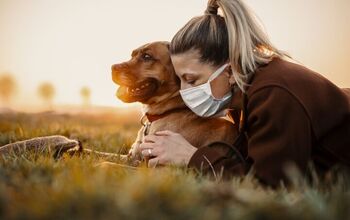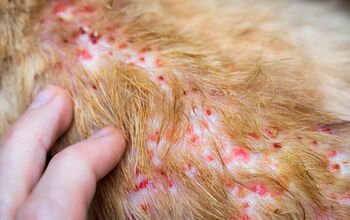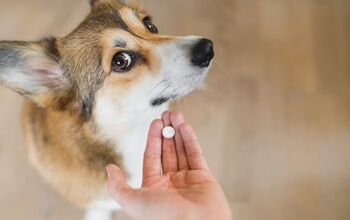The Amazing Benefits Of Apple Cider Vinegar For Dogs

Another natural remedy that’s crossed over from humans to canines, apple cider vinegar for dogs offers a number of health benefits. Not only can this liquid be used to improve your dog’s digestion and to clear skin infections, but it can also help to repel fleas and other biting insects. There are many ways to use apple cider vinegar for your dog and his health.
Related: Natural Health: Brewer’s Yeast Benefits For Dogs
Apple cider vinegar can be used in a number of herbal remedies for dogs as well as humans. By understanding the benefits of apple cider vinegar for dogs, you can put this low-cost solution to work, prioritizing the health and well-being of your pup.
A naturally acidic substance, apple cider vinegar can help to raise the acid levels in your dog’s stomach to encourage faster and more efficient digestion. Not only can this be used as a natural laxative by boosting the digestive system and providing relief from constipation, but it can also be used to prevent an excess of gas or bloating in the body.
While apple cider vinegar on its own will not cure a urinary tract infection, it can be used as part of a larger natural treatment plan. However, it should be noted that this ‘cure all’ shouldn’t be relied on to treat an existing infection. It should be used under the supervision of a veterinarian.
With both antibacterial and antifungal properties, mildly diluted apple cider vinegar can be used to help prevent the growth of candida and other skin-related infections and irritants. Exposing open wounds or abrasions to apple cider vinegar can be painful for your dog. Be cautious when applying it and avoid it if you know it will cause more harm than good in a given situation.
If your dog is experiencing dry, flaky skin from a condition such as eczema, you may be able to provide some short-term relief by combining apple cider vinegar with a standard moisturizing product. This is due to the fact that apple cider vinegar helps to restore the pH balance of your dog’s skin by boosting the acidity levels. Both antibacterial and antifungal properties can also help to kill off any yeast and bacteria from the skin.
Are you looking for an easy, all-natural solution for repelling mosquitos and other bugs? Fill a standard spray bottle with 50% water and 50% apple cider vinegar. You can also add a few drops of whatever pet-safe essential oil you prefer to help mitigate the smell. Spray this on your dog directly or around the areas that he frequents most.
By including apple cider vinegar in your dog’s regular routine, you can help to improve the acid-alkaline balance. This is beneficial in preventing any bacterial or viral diseases that may be on the horizon as it alters the environment in which they would grow, removing the ideal environment that encourages them to take over the body and making it difficult for them to survive.
If you are currently working on improving your dog’s overall heath and well-being, then you may be looking in-depth at his blood sugar levels and cholesterol levels. These are both indicators not only of his status at this time, but also of the potential for illness and disease in the future. Studies show that his may be attributed to the activation of an enzyme in the body called AMPK (adenosine monophosphate-activated protein kinase).
There are many benefits to be experienced in terms of your dog’s coat and skin including anti-aging properties, combating tangles and frizz in the fur, helping the fur to retain moisture by sealing the hair cuticles, relieving dandruff, and even soothing the effects of a sunburn.
Combine equal parts warm water and apple cider vinegar to make an all-natural ear cleaner that can be used to wipe down your dog’s ears, removing any dirt, grime, or wax build up. While this can provide some relief in terms of antibacterial and anti-inflammatory properties, it should not be used to treat a current infection. Ear infections can lead to serious complications and should be treated professionally before turning to any natural remedies to keep future infections at bay.
Giving your dog apple cider vinegar orally can help to repel insects, to improve digestion, and to restore his body’s pH balance. To start treating your dog with apple cider vinegar, begin by giving him one teaspoon daily mixed with his food. This is the dosage for a 50-60 pound dog – for a smaller dog (10-25 pounds), a half teaspoon is sufficient, while for a larger dog (75 pounds and over), you can double the dosage to two teaspoons.
Related: 4 Fabulous Benefits Of Olive Oil For Dogs
To use apple cider vinegar to treat skin infections, sores or to improve your dog’s skin and coat, mix apple cider vinegar with an equal amount of water and work it into your dog’s skin and coat by hand during his next bath. To repel fleas and ticks, or to deal with an existing infection, bathe your dog then apply a solution of equal parts water and apple cider vinegar.
Using apple cider vinegar to improve your dog’s health is as easy as adding a teaspoon or so to his food once a day. Apple cider vinegar itself is not particularly rich in nutrients, but it contains compounds that increase the body’s ability to absorb and assimilate other nutrients. For example, acetic acid can help to increase the ability of your dog’s body to absorb calcium. Apple cider vinegar also provides antiseptic benefits – it will help to prevent the growth of pathogenic viruses and bacteria in your dog’s digestive tract which will also boost the immune system.
Apple cider vinegar for dogs is a simple but effective natural remedy for a variety of conditions and health problems. Before you start using it for your dog, however, you should check with your veterinarian to make sure it’s right for your pooch.
Do you already use apple cider vinegar with your dog? Have you seen any changes or improvements? Let us know in the comment section below.

Kate Barrington is the loving owner of two cats (Bagel and Munchkin) and a noisy herd of guinea pigs. Having grown up with golden retrievers, Kate has a great deal of experience with dogs but labels herself a lover of all pets. Having received a Bachelor's degree in English, Kate has combined her love for pets and her passion for writing to create her own freelance writing business, specializing in the pet niche.
More by Kate Barrington























